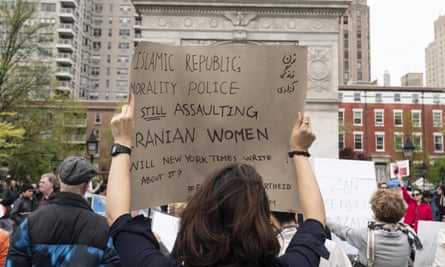An Iranian court’s decision to pass the death sentence against Toomaj Salehi, a popular Iranian rapper and regime opponent, has led to international protests and damaged Iran’s fledgling efforts to exploit crackdowns on unrest in US university campuses over Gaza as an abuse of human rights.
Crowds gathered in the US, Europe and Canada on Sunday to support Salehi, while dozens of political prisoners in Iran’s Ghezel Hesar prison issued a statement condemning the death sentence, calling it “the culmination of gross human rights violations in Iran”. Salehi has also won the support of major US rappers, as well as human rights groups.
The Iranian press has been closely following the campus unrest in the US and France, including reports that 900 American students have been detained in April. The social media account of the supreme leader, Ayatollah Ali Khamenei, said: “See what is happening in the world. In western countries, in England and France, and in states across the US itself, people are coming out in huge numbers to chant slogans against Israel and America. US & Israel’s reputation has been ruined. They truly have no solution.”
But even some reformist Iranian newspapers said the regime’s propaganda in the international arena had suffered reputational damage as a result of the surprise decision to issue the death sentence against a singer associated with defiance, but not violence against the regime.
Ever since he shot to prominence, Salehi has been distinguished by his personal bravery and determination to help unite the Iranian Women, Life, Freedom movement.

Salehi was arrested in October 2022 in Chaharmahal and Bakhtiari province after making public statements in support of the nationwide protests caused by the death in police custody of Mahsa Amini, a 22-year-old Kurdish Iranian woman arrested for allegedly wearing an “improper” hijab.
After reports by UN experts that he had been beaten in jail, in July 2023 he was handed a jail sentence of six years and three months.
In November last year, after more than a year in jail including more than 200 days’ solitary confinement, the supreme court released him on bail due to a technical flaw in the sentencing – only for him to be arrested again by plainclothes officers two weeks later. He had recorded a song outside the jail in which he had been held, claiming he had been tortured in jail including through adrenaline shot injections.
In a surprise move last week the Isfahan revolutionary court raised his punishment to the death penalty, a decision that has been described as unprecedented. In what may be a sign of a power struggle between the two courts, he was sentenced for “corruption on Earth”. He has 20 days to appeal.
The actor Nazanin Boniadi told a rally at the weekend: “When he takes to the streets, when he puts pen to paper, when he uses his voice, the regime trembles. Why? Because he speaks for the people. Things that the people do not dare to say, he says.”
Kaveh Shahrooz, a Canadian activist in Toronto, said he was personally blown away by Salehi’s courage. “There are people outside Iran in this city who are scared of talking and Toomaj was talking about them inside. His talent and his empathy and social conscience are hard to deny and his courage is hard to believe and his courage is contagious.”
Iran is in the throes of a new crackdown against women deemed to be flouting the Islamic dress code and is also increasing executions, the number of which, according to the Norway-based Iran Human Rights, has already reached 147 this year.
Salehi has previously said that Iranians “are living somewhere horrific. You are dealing with a mafia that is prepared to kill an entire nation in order to keep its power, money and weapons.”
His uncle in Germany Iqbal Iqbali said Iran was “at a stage where the explosion of the anger of the Iranian people against boundless tyranny is imminent”.
